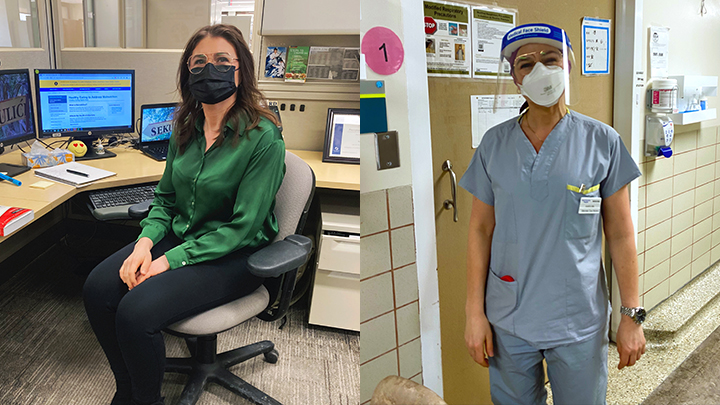
March 21, 2022

When the call for help came in January, Karolina Sekulic was one of many across AHS who answered. Sekulic was redeployed from a cubical environment to a COVID-19 medicine unit at the Royal Alexandra Hospital for three weeks. Photos by Tyler Tamayose & Sharman Hnatiuk.
Story by Sharman Hnatiuk | Photos by Tyler Tamayose & Sharman Hnatiuk
EDMONTON — Karolina Sekulic was one of many staff and physicians who answered the redeployment call to inpatient units in January as hospitalizations of COVID-19 patients grew and the Omicron variant challenged staffing levels at healthcare facilities across the province.
“I thought I understood the impact of the pandemic, but until I saw firsthand how sick patients were, and how busy the care team was, I didn’t appreciate how challenging COVID-19 has been on our healthcare system,” says Sekulic.
Although she had worked as a dietitian in a hospital setting in the past, the provincial practice lead with nutrition, food, linen and environmental services had never worked in an acute care setting. Having spent 11 months redeployed to contact tracing earlier in the pandemic, Sekulic was familiar with the ask to step up when needed, and graciously traded in her desk job three days a week for a pair of scrubs and an alternate care worker placement on the COVID-19 medicine unit at the Royal Alexandra Hospital (RAH).
After her four-hour orientation, Sekulic found herself supporting mainly healthcare aides and nursing staff with tasks from changing the garbage and collecting supplies to feeding patients.
While each day brought new tasks and activities, one constant throughout her three-week placement was how Sekulic always felt comfortable and supported as she carried out her responsibilities on the unit.
“I can appreciate how hard it must be for redeployed staff, especially those who have never worked in patient care, to be uprooted and asked to provide a completely new skill set,” says Tyler Tamayose, manager of the RAH Pandemic Planning and Staffing Task Force.
“Our team worked hard to provide a strong foundation of support from orientation through to the unit placements. By ensuring our alternate care workers felt supported in a new frontline position, we could help improve the patient and provider experience on the unit, as well as help a new colleague find value and pride in their redeployment.”
For Sekulic, the most impactful moments of her redeployment happened when she drew upon her background as a dietitian to assist patients at mealtime.
“In my provincial role, I help increase awareness around malnutrition and have developed resources to help staff ensure patients in acute care and community healthcare settings can achieve their best nutritional health,” she says.
“Helping to feed patients and ensuring their nutrition needs were achieved gave me the opportunity to put my clinical advice into practice in an acute-care setting. As an alternate care worker, the simple task of helping someone eat was incredibly gratifying.”